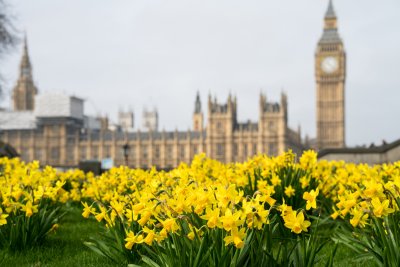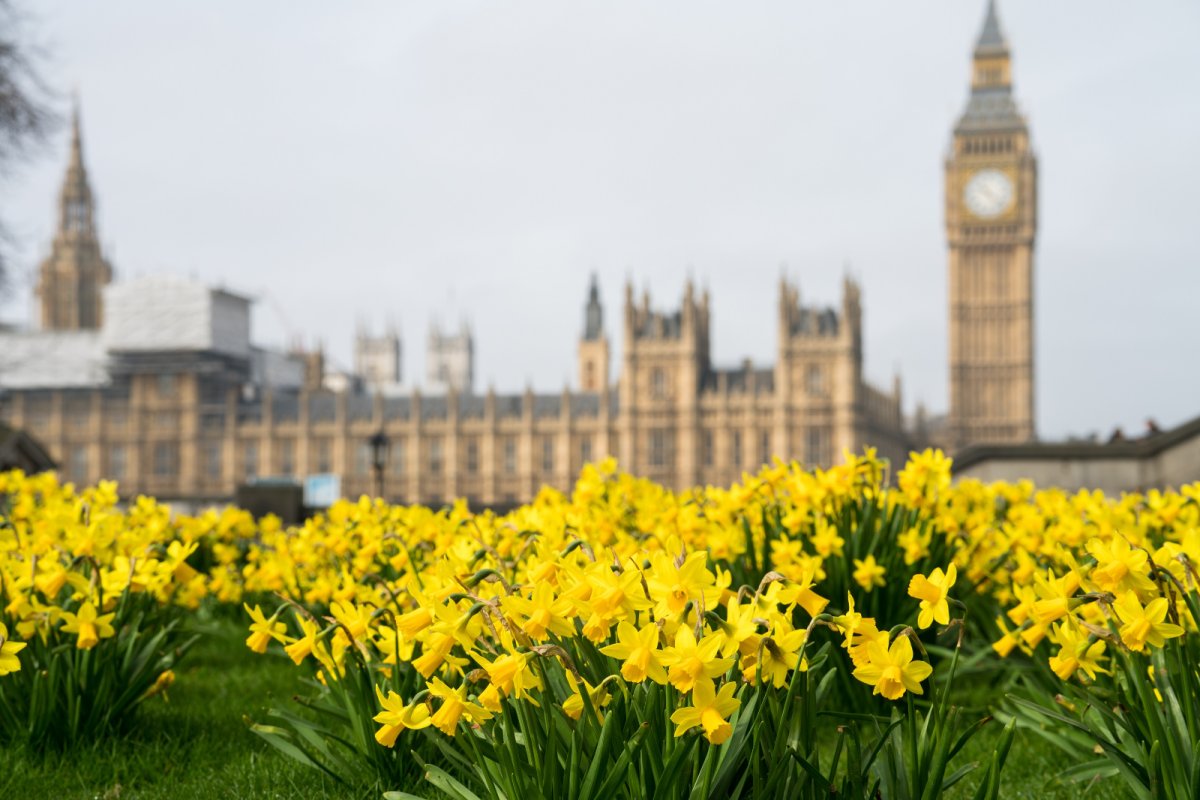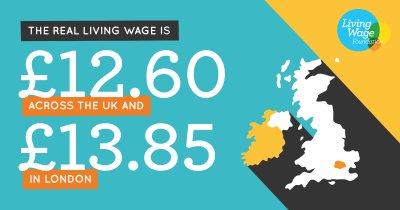 Daffodils with Big Ben and the Palace of Westminster in background. Copyright: Pajor Pawel |shutterstock
Daffodils with Big Ben and the Palace of Westminster in background. Copyright: Pajor Pawel |shutterstock
Food prices are still rising and supply chains and school caterers are struggling, amid growing calls to invest in the nation’s dietary health.
Sustain’s submission to the UK Treasury prior to the 2024 Spring Budget laid out the case for building on the success of the Soft Drinks Industry Levy to generate more revenues for investment in public health, increasing access to healthy food for children and families on the lowest incomes, and to invest in sustainable farming and fairer supply chains.
Here is our analysis of whether the Chancellor's budget has delivered for our alliance's priorities, and where more work is needed.
Household Support Fund extended for six months
The Household Support Fund is a pot of money available to local authorities to help meet the emergency needs of local people, including households experiencing the crisis of acute and long-term food poverty. Some local authorities also use this money to pay for food provision during the school holidays, for children eligible for free school meals.
The Chancellor has announced an extension of the Household Support Fund for another six months, allocating an additional £500 million. The Chancellor said that "the battle against inflation was still not over and now is not the time to stop the targeted help it offers.”
Sustain, along with many organisations, had been calling for further extension of the Household Support Fund for another 12 months to April 2025 in our submission to the Budget. In February, we joined Barnardo’s and over 120 other organisations in a joint letter to Chancellor Jeremy Hunt. The Fund has been distributing additional support to families experiencing food insecurity, as well as a range of other needs. 37% of Household Support Funds were used by councils to provide support to children eligible for free school meals during school holidays – including cash support, food vouchers or boosting holiday clubs and programmes.
With our Sustainable Food Places network telling us they are experiencing nine times the level of requests since before the pandemic, councils and local food partnerships are struggling to meet needs, and budgets are stretched to breaking point.
Did the Spring Budget deliver? …. To a certain degree...
Sustain's Head of Local Action Sofia Parente said:
“We are pleased with the renewal of the Household Support Fund. However, the renewal is for a short period of time (6 months) and the announcement comes at the very last minute for councils to effectively plan the allocation of the fund. We hope the Chancellor and DWP use the next 6 months to plan mechanisms to support our most vulnerable residents with the cost of essentials, and particularly with solutions to prevent holiday hunger and promote access to healthy and nutritious food for those at risk of food insecurity.”
Will more children get a Healthy Start?
Sustain's Budget submission had also called for action to improve uptake, eligibility and value of Healthy Start payments, which provide vital access to fruit, vegetables, milk or formula for pregnant women and families on very low incomes with children under the age of four. The Food Foundation estimates around 1 in 4 households with children under the age of four are experiencing food insecurity (June 2023). However, with no change to the earnings threshold for entitlement of £408 per month or less, fewer and fewer children and pregnant women are now qualifying for this vital nutritional safety net.
We are urging the Government to expand eligibility to all those in receipt of Universal Credit, and extend permanent eligibility for families with No Recourse to Public Funds. Furthermore, inflationary rates over the past two years have reduced the purchasing value of the payments, with particular concern around the prices of infant formula. Together with the Local Government Association, we have called for the Healthy Start programme to keep pace with inflation, starting with uplifting the payments from £4.25 to £5.24 per week for young children, and from £8.50 to £10.48 per week for babies under 12 months.
Did the Spring Budget deliver?
Local Action Coordinator Vera Zakharov said:
“This is another disappointing Spring Budget for babies, young children and pregnant women facing food insecurity and poor nutrition. The Healthy Start Scheme was left behind in 2023 when other benefits saw an inflationary uplift, and remains the same this year. Except it’s not the same: the value of this vital nutritional safety net is shrinking in real terms as fruit, vegetable and infant formula prices keep rising. Meanwhile, eligibility for Healthy Start is dropping, while families on very low incomes continue to struggle to afford healthy food. Good nutrition giving children the best start in life should be a top priority for the Government, an investment in our country’s future, not an afterthought.”
Did the Budget expand Healthy School Food For All?
In November 2023, our Say Yes campaign partners delivered signatures to Downing Street from 120 regional and national organisations, and from individuals, schools and groups in 1200 different locations across the UK, calling on the Government to invest in children’s health through expansion of hot, nutritious school meals for all.
Sustain's Budget submission drew on evidence of the long-term economic benefits of universal meal provision, estimated at £1.71 for every £1 spent, or £99.5 billion over the next 20 years. With Scotland and Wales committed to making primary school meals part of their core education provision, and the Mayor of London stepping into the funding gap in the capital, there is a growing postcode lottery of access to school meals that is simply unfair for children. It is now six years since the Government capped entitlement to school meals at a total household earnings level of just £7,400 per year (after tax, before benefits). The Institute for Fiscal Studies has also warned about the cliff-edge effect that the threshold creates, which creates a disincentive to some working families to increase working hours.
Our Budget submission had called on the Treasury to work with the Department for Education to review and increase the current eligibility criteria. As part of a school food review, we are urging Government to establish a progressive multi-year roadmap towards full universal provision, starting with increasing eligibility to include all children living in poverty as the most urgent step.
We had also recommended expansion of the School Fruit and Veg Scheme to provide every primary school child with a free piece of fruit or vegetable each day, not just pupils in Key Stage 1. This measure would contribute to reducing health inequalities, increasing access to healthy fruit and vegetables especially for children from the most disadvantaged backgrounds.
We are dismayed that the Spring Budget has once again ignored these calls from Sustain and hundreds of organisations, school leaders and teachers, caterers, local council leaders and children and young people themselves.
Did the Spring Budget deliver?
Children’s Food Campaign Manager Barbara Crowther said:
“Having inspected this Spring Budget, we are awarding it an ‘inadequate’ rating when it comes to school food. There’s not even a crumb from the Chancellor’s table for the nation’s children during school term time. Local council budgets across the country are at breaking point, and they simply cannot keep stepping into the growing funding void. There is no vision, no new commitment and no delivery of any expanded access to hot nutritious meals for the nation’s school children.”
Expanding on the success of the Soft Drinks Industry Levy
As a leading organisation in the Recipe for Change coalition, we had called on the Treasury to initiate a call for evidence on measures to incentivise a healthier food and drink industry. Our joint submission to the Budget detailed the potential long-term economic benefits from preventing up to 2 million cases of diet-related diseases through the introduction of further levies on salt and sugar in processed food and drinks.
Building on the success of the current Soft Drinks Industry Levy (SDIL), we had made the case for increasing the charging rates and lower the entry threshold, which would have the effects of either reducing sugar levels further, or potentially increasing levy revenues that could be used for investment in children’s health.
With the increase in tobacco duty and the introduction of a new tax on vaping from October 2026, there is strong precedent for using fiscal levers to support public health goals. Yet the Soft Drinks Industry Levy, now six years old, has never been uprated. At a time when public spending on health is severely under pressure, while overall sugar consumption through other food and drink is increasing, not decreasing, it is a huge oversight by the Government not to make the well-established and well-accepted SDIL work a bit harder and also apply these lessons elsewhere in the food system. We at Sustain, and our partners in the Recipe for Change coalition, plus a growing number of health bodies and think tanks, will continue to make this case.
Did the Spring Budget deliver?
Katharine Jenner, Director of the Obesity Health Alliance, said:
“There are few policies that are good for business, good for health and good for Government but the Soft Drinks Industry Levy (SDIL) is one of them. It is disappointing when we are so urgently in need of access to healthier food and to funds for children’s health programmes that the Chancellor has not included extensions to SDIL in the budget, or called for evidence on further measures to incentivise healthier food production. We will continue to campaign as part of the Recipe for Change coalition for policies that work to make the healthier choice the easier choice for everyone.”
Did the budget deliver for sustainable farming?
Sustain’s Budget submission called on the Treasury and Defra to set the farming and environmental annual budget to deliver environmental public goods at a scale that meets the climate targets. The ELMs scheme must reflect the reality of the scale of need in terms of reversing environmental harms.
We called for a comprehensive analysis to understand the budgetary needs for ELMs to deliver its aims of delivering public goods, as well as a multi-annual budget that reflects this need. We also called for more funding for the Agricultural Transition Plan to further invest in skills, training, advice, capital grants, farmer-led research and development.
Sustain also called for an investment into fairer supply chains. Our Unpicking food prices report found that British farmers often end up with profits of less than 1p from the food items they produce, especially when supplying supermarket chains. Farmers need to hold more of their profit so that they can transition to farming practices that work with nature.
Sustain is part of a group of organisations calling on Defra to pilot a £5 million fund that would help new food enterprises work with farmers across England for a fairer and more resilient food supply. By investing in new food hubs across England, the Government can support a new future for the UK’s agri-food system that delivers for the environment and on food security.
The Treasury announced that they will extend agricultural property relief to certain environmental land management agreements from 6 April 2025.
Our Sustainable Farming Coordinator Will White says:
“We welcome the Chancellor's decision to extend the eligibility for Agricultural Property Relief to habitats created via the Environmental Land Management Schemes, which will allow farmers to make more space for nature without being penalised by un-necessary tax. However, more funding is needed, with an estimated £4.4 billion a year needed to meet key environmental targets. We also know that farmers are still not seeing enough profit for their produce due to unfair supply chains. We called on the Chancellor to set up a local food enterprise fund to provide support for localised agri-food infrastructure, therefore we see this as a missed opportunity.”
Did the Budget deliver for small bakeries?
In the UK, approximately 2,500 micro and small bakeries contribute to the revitalisation of high streets and offer valuable skills and fulfilling employment opportunities within their communities.
Sustain's Real Bread Campaign called on the Government to raise the small business rates relief threshold, allow micro and small bakeries to reclaim VAT on energy costs, and introduce easy-to-apply-for grants to cover increases in operational costs. We also called for the establishment of a government-backed, not-for-profit collective procurement body for energy and flour at bulk rates, enabling small bakeries to benefit from discounted prices.
None of these helpful recommendations were referenced in the Spring Budget. The Real Bread Campaign will continue to campaign for a more level playing field on which SME bakeries have a better chance to thrive.
Sustain: Sustain The alliance for better food and farming advocates food and agriculture policies and practices that enhance the health and welfare of people and animals, improve the working and living environment, enrich society and culture and promote equity.
Sustain
The Green House
244-254 Cambridge Heath Road
London E2 9DA
020 3559 6777
sustain@sustainweb.org
Sustain advocates food and agriculture policies and practices that enhance the health and welfare of people and animals, improve the working and living environment, promote equity and enrich society and culture.
© Sustain 2024
Registered charity (no. 1018643)
Data privacy & cookies
Icons by Icons8








